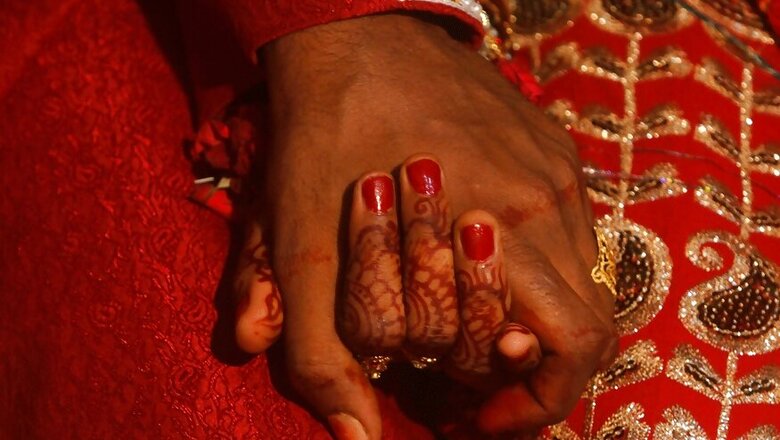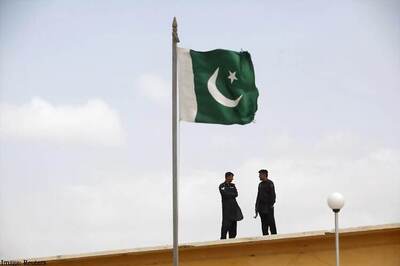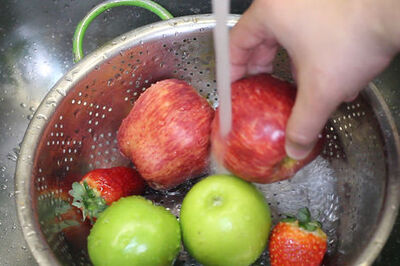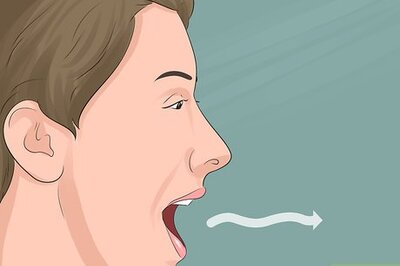
views
New Delhi: Resolute to "preserve and protect the human rights of the married girl child", the Supreme Court on Wednesday declared that sexual intercourse with minor wife will amount to rape, and that there cannot be any immunity to such acts even when the girl is aged between 15 and 18 years.
This judgment will act prospectively. Rape, being an offence cognizable in nature and against the society under the IPC, a man will henceforth face a minimum of seven years in jail for having sex with a minor wife, apart from being prosecuted under the Child Marriage Prohibition Act for contracting marriage with a girl child. The prosecution can be initiated on a complaint by the girl child or even by any other person at her instance within a year of the alleged offence.
This landmark verdict has acknowledged "marital rape of a girl child between 15 and 18 years of age", which will be seen as a progressive step towards recognising the concept of 'rape' in a marriage.
However, in its 127-page verdict, the bench of Justices Madan B Lokur and Deepak Gupta clarified that it was not ruling upon the larger issue of marital rape of adult women "since that issue was not raised before us by the petitioner or the intervener". Therefore, the issue of marital rape is still open to be examined by the top court.
In its judgment on Wednesday, the bench held as invalid Exception 2 clause in Section 375 (rape) of the IPC, which laid down that it will not amount to rape if a man has sexual intercourse with his wife, who is between 15 and 18.
This protection was inserted in the IPC in 1950, only to create a separate class among minors who are between 15 and 18; and are married due to customs, traditions etc. No such immunity was there for minors below 15.
Even though the age of consent for sex and valid age of marriage for women remained at 18 under other laws and that the Child Marriage Prohibition Act also made underage marriage a crime, the controversial stipulation in the rape provision under the IPC was not changed. It created a dichotomy wherein only because a girl is married early, sexual intercourse with her – with or without consent, did not invite the rape charge.
While a man and his family could be booked for a child marriage with a punishment up to 2 years in jail, having sex with minor wife was not considered as an offence at all under the IPC because of Exception 2 in Section 375.
The bench on Wednesday struck down this dichotomy, making age of consent for sex 18 years across the board, making it clear that “it cannot be said with any degree of rationality that such a girl child loses her status as a child in need of care and protection soon after she gets married.”
"Viewed from any perspective, there seems to be no reason to arbitrarily discriminate against a girl child who is married between 15 and 18 years of age. On the contrary, there is every reason to give a harmonious and purposive construction to the pro-child statutes to preserve and protect the human rights of the married girl child," held the Court in its 127-page verdict.
While the PIL petitioner NGO Independent Thought challenged the validity of the exception clause in the rape provision, the government cited prevalence of child marriages and the prospect of making husbands vulnerable to be booked for rape in defence of this provision.
But this justification by the Centre did not go down well with the bench. It this held: "Surely, the Union of India cannot be oblivious to the existence of the trauma faced by a girl child who is married between 15 and 18 years of age or to the three pro-child statutes and other human rights obligations. That these facts and statutes have been overlooked confirms that the distinction is artificial and makes Exception 2 to Section 375 of the IPC all the more arbitrary and discriminatory."
About the socio-economic conditions arising out of several child marriages, the Court held that "merely because child marriages have been performed in different parts of the country as a part of a tradition or custom does not necessarily mean that the tradition is an acceptable one nor should it be sanctified as such."
It underlined that “traditions that might have been acceptable at some historical point of time are not cast in stone", and that "if times and situations change, so must views, traditions and conventions”, in particular when "those days are long gone when a married woman or a married girl child could be treated as subordinate to her husband or at his beck and call or as his property."
According to the Court, an early marriage takes away the self-esteem and confidence of a girl child and subjects her, in a sense, to sexual abuse. "Under no circumstances can it be said that such a girl child lives a life of dignity. The right of a girl child to maintain her bodily integrity is effectively destroyed by a traditional practice sanctified by the IPC," noted the bench, adding sooner this practice is given up, "it would be in the best interest of the girl child and for society as a whole."
The bench also drew a parallel between the IPC provision and the Prevention of Children from Sexual Offences (POCSO) Act to arrive at a conclusion that the distinction of married girl child between the age of 15 and 18 is completely arbitrary.
"Marital rape of a girl child is effectively nothing but aggravated penetrative sexual assault and there is no reason why it should not be punishable under the provisions of the IPC. Therefore, it does appear that only a notional or linguistic distinction is sought to be made between rape and penetrative sexual assault and rape of a married girl child and aggravated penetrative sexual assault. There is no rationale for this distinction and it is nothing but a completely arbitrary and discriminatory distinction," it held.
Giving a purposive and harmonious interpretation to Exception 2 of Section 375 in the IPC, the Court said that it is reading down this provision to now state: "Sexual intercourse or sexual acts by a man with his own wife, the wife not being under eighteen years of age, is not rape."
This provision earlier read: "Sexual intercourse or sexual acts by a man with his own wife, the wife not being under fifteen years of age, is not rape."
About child marriages, the Court further said: "Civil society can do just so much for preventing such child marriages but eventually it is for the Government of India and the State governments to take proactive steps to prevent child marriages so that young girls in our country can aspire to a better and healthier life."




















Comments
0 comment